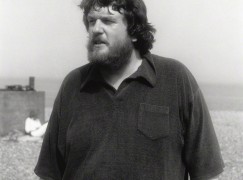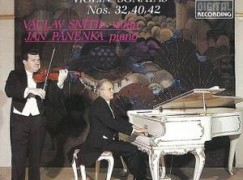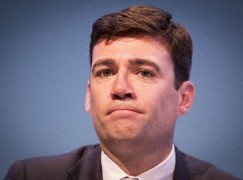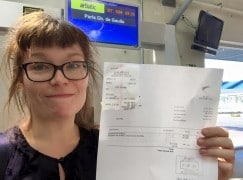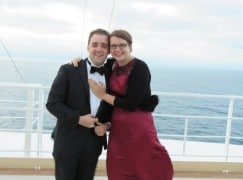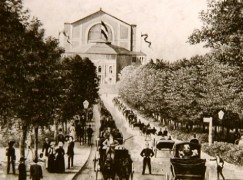Friends of the baroque harpsichord and conductor, who died last week, have assembled the following account of his life, replete with personal tributes.
A reserved and very discreet man, precise and scrupulous, a conscious and meticulous musician and conductor, a well-known scholar for his attention and philological attitude, for his enormous knowledge, often overwhelming, deep, as the result of many years devoted to the Baroque repertoire and the analysis of scores and texts, Alan Curtis passed away in Florence on July 15th 2015, unexpectedly, a shock for his family and friends.
Born on November 17th 1934, driven by his passion, determination, abnegation, his life was entirely dedicated to music and to the rediscovery of the original musical practice.
EARLY FRIENDSHIPS
His 1956 – 58 Fulbright Awards brought him to Amsterdam, where his harpsichord studies with Gustav Leonhardt forged a lasting friendship, united as they were by a similar vision and love for all the related arts. Alan Curtis’s time there, with both Leonhardt and Nicholas Harnoncourt, as well as the harpsichord maker Martin Skowroneck, brought added depth to the years he worked at his doctoral degree. This led inevitably to his being at the forefront of the revival in presentation of (in his words) “pre-romantic music”.
BEING THE FIRST
Alan Curtis was the ‘first’ in so many areas that it is almost impossible to list them or to believe that one man could have that degree of vision. He wanted (again using his own terminology) ‘to be radically authentic’ in giving new life to what is generally considered to be ‘ancient music’ and it was this spirit of radicalism, that led him to be the first in reconceiving the treatment of many fields, that are now accepted as being standard musical practice. Among them Alan Curtis was the first modern harpsichordist to unlock the mysteries of the Louis Couperin unmeasured preludes, (it should be noted that he did this when still a graduate student working toward a Masters Degree in Musicology).
He was the first to commission both the split-key enharmonic harpsichord from Dowd and the first contemporary authentic Chittarone from Warnock and was also the first to re-introduce the 18th century practice of using the Arch lute in recitative for Handel Opera – with Admeto in ‘79.
He was the first to revive a Rameau opera with period instruments and authentic choreography (by Professor Shirley Wynne,) the first to present Monteverdi’s L’incoronazione di Poppea, as intended by the composer in his orchestration of the period of composition. He had presented and performed this first in Berkeley in the early ‘60’s, which was so successful that it was then performed in Amsterdam, Brussels, Spoleto, Innsbruck and Venice, where it was nationally televised from La Fenice, and then recorded by Fonit Cetra. It is now widely accepted as being the ‘gold standard’ for reconstruction and revivals of ‘period operas’.
NOTABLE PHILOLOGOCAL RECOVERIES
Other remarkably successful ‘reconstructions’ have included Cesti’s Il Tito, his Semiramide, and Händel ‘s Rodrigo, which Curtis conducted in Innsbruck, Madeira and Lisbon in 1984 for the first time since Händel himself presented it to the Medici in 1707. He also reprised this masterpiece in Siena in 1997. Among better-known but nonetheless unjustly neglected repertoire, he was considered a champion of Gluck’s Armide, of which he has led three very different productions, including one with his own orchestra of period instruments at the Theatre Musical de Paris (Chatelet) and for four different productions of Händel’s Ariodante (La Scala ’81 and ’82, with Pier Luigi Pizzi, Innsbruck ’82, Wexford ’85, and lastly in Spoleto – Italy 2007).
When in 2006 he created the first modern reprise of Vivaldi’s Ercole su’l Termodonte, with John Pascoe for the Spoleto Festival – Italy, its 2007 DVD won “DVD of the year”.
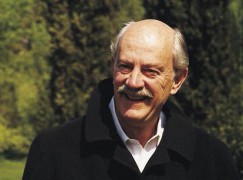
Life and friends
Having for years divided his time between Berkeley (California), where he played and conducted concerts and operas, Alan Curtis spent his last years performing principally dramatic music from Monteverdi to Mozart. An article on him in «Orpheus» (Berlin) was titled “The avant-gardist of early music”.
In fact, already as a young student in the ’50s, he was the first modern harpsichordist to confront the problems of Louis Couperin’s unmeasured preludes for harpsichord. Shortly thereafter, he became a pioneer in the return to original instruments and Baroque performance practises in early operas. In collaboration with Shirley Wynne, he was the first to revive a Rameau opera with period instruments and authentic choreography.
His radically new ‘reconstruction’ of Monteverdi’s L’incoronazione di Poppea, first heard in Berkeley in the ’60s, marked the first time in three centuries that a late dramatic work of Monteverdi was performed as intended by the composer, i.e. without the modern orchestration still often mistakenly thought to be “necessary”. He commissioned both the first authentic chitarrone (Warnock) and the first chromatic (split-key) harpsichord (Dowd) to be built in modern times, and taught his singers to follow the tuning systems of the period (with pure major thirds).
Poppea was then mounted with great success in Amsterdam, Brussels, Spoleto, Innsbruck and Venice (where it was nationally televised from La Fenice, and recorded by Fonit Cetra). A landmark performance of Händel’’s Admeto in Amsterdam’s Concertgebouw (recorded by EMI and then, thirty years later, reissued on CD by Virgin Classics), was hailed as the first successful attempt to revive Händel’s opera orchestra, including the now widely-accepted but then unheard-of use of the archlute. Other prize-winning recordings included Stradella’s Susanna, Cavalli’s L’Erismena, and Bach’s Goldberg variations (reissued on CD by EMI), French and English suites (Teldec CD), and about thirty other harpsichord discs.
He has always been in the forefront of the movement to enlarge and revivify the static operatic repertory. A lavishly authentic revival of Landi’s Il Sant’Alessio in Rome and Innsbruck in 1981 was an unexpected and stunning success, as were three different productions of the first Jommelli revival in modern times: La schiava liberata (Amsterdam, Naples, and Berkeley). Other remarkably successful ‘philological recoveries’ have included Cesti’s Il Tito, his Semiramide, and Händel’s Rodrigo, which Curtis conducted in Innsbruck, Madeira and Lisbon in 1984 for the first time since Handel himself presented it to the Medici in 1707.
Francesco Sacrati’s La finta pazza, was given its first revival in three centuries in a specially-constructed Baroque theatre in Campo Pisani, Venice in a production by La Fenice in July, 1987. Among better-known but nonetheless unjustly neglected repertory, he has been a particular champion of Gluck’s Armide, of which he has led three very different productions, including one with his own orchestra of period instruments at the Theatre Musical de Paris (Chatelet). He was also responsible for four different productions of Händel’s Ariodante (La Scala ’81 and ’82 with Pier Luigi Pizzi, Innsbruck ’82, Wexford ’85, Spoleto Italy 2007 with John Pascoe), and the first modern revival of Vivaldi’s Il Giustino, at the Teatro Olimpico in Vicenza, later taken to Versailles, Venice, Milan, Buenos Aires, Houston and Ludwigshafen. With a different cast, he performed it again in Solothurn in 2000 and Rotterdam, De Doelen in 2001, where it was recorded for Virgin. He conducted the Portughese premieres, in Lisbon, of Händel’s Fernando (the original version, set in Portugal, of Sosarme), Monteverdi’s Il ritorno di Ulisse and Mozart’s Il re pastore, the latter staged and designed by Pier Luigi Pizzi. His new performing edition of Monteverdi’s Il ritorno di Ulisse, first performed in Amsterdam’s Concertgebouw, then staged in Siena in ’91 and released the following year as a Nuova Era CD and revived in ’93 for the Festival of Dresden, was published by Novello (2002) and staged for the Oslo Chamber Music Festival in 2006. For La Fenice, shortly before it burned, he conducted the first performances since the 18th century of Buovo d’Antona (designed by Pier Luigi Pizzi), Goldoni’s opera buffa set to music by Traetta, later issued on CD by Opus 111. His madrigal group was invited by Werner Herzog to be in his 1996 documentary film on Gesualdo. The CDs of madrigals by Michelangelo Rossi, Antonio Lotti, and the complete duets of Monteverdi on Virgin Classics (Diapason d’or 1999) have been well received by the international press, as have their subsequent recordings of two 17th-century dramatic oratorios: Il Sansone by Benedetto Ferrari (Diapason d’or 2000) and Assalonne punito by P.A. Ziani (Choc de la Musique). In the summer of 2000, he conducted a new production of Radamisto for the Halle Händel festival and, for the Amsterdam Concertgebouw, Händel’s superb but practically unknown opera Arminio, which has appeared to international acclaim on CD for Virgin. The Handel Society of London voted it best Händel recording of the year 2001.
In 2002 he conducted Handel’ Händel’s Giulio Cesare in Monte Carlo, Deidamia in Siena (recorded by Virgin and awarded both the Preis der deutschen Schallplattenkritik as best opera CD of 2003 and the 2004 International Händel recording Prize), and a program of Händel arias called “La Maga Abbandonata” for the Resonanzen Festival in Vienna (Grosse Saal, Konzerthaus), subsequently a best-selling CD for BMG Classics, who also released the opera Lotario. More recently he and Il Complesso Barocco recorded Händel’s operatic duets (“Amor e gelosia”) with Patrizia Ciofi and Joyce DiDonato, as well as his operas Radamisto and Fernando, and a masterpiece by the Viennese court composer Francesco Conti, the oratorio David (Virgin Classics). The list of highly-acclaimed Händel opera performances and recordings continues with Rodelinda, Floridante, Tolomeo, Ezio, Berenice, Giove in Argo, Giulio Cesare, Alcina and Ariodante, the last two with Joyce DiDonato in the title roles.
Using a brilliant reconstruction by Alessandro Ciccolini of the missing parts to Vivaldi’s rediscovered Motezuma, Il Complesso Barocco also made the first recording (DGG Archiv) as well as staged performances in Lisbon, Wiesbaden, Bilbao and Italy (available in DVD from Dynamic). In 2006 the same team produced the first modern reprise of Vivaldi’s Ercole su’l Termodonte, designed and staged by John Pascoe for the Spoleto Festival – the DVD of which won DVD of the year in 2007. For the 50th anniversary of this festival in 2007 Alan Curtis was also invited to conduct a new production by Handel’s Ariodante again designed and staged by John Pascoe (both productions also available in DVD from Dynamic). Other new recordings with Alan Curtis conducting Il Complesso Barocco include Haydn operatic arias and overtures with Anna Bonitatibus, Porpora operatic arias and symphonies with Karina Gauvin, Händel arias for Carestini with Vesselina Kasarova, and “Hidden Händel” with Ann Hallenberg, a collection of little-known arias, some still unpublished. An unusual recent project was a Händel Bestiary, a collaboration with his dear friend, the celebrated novelist Donna Leon. Already a best-seller in German-speaking countries, under the title Tiere und Töne, editions have sold out and been produced in other languages, all with illustrations by Michael Sowa which accompany twelve arias by Händel, about twelve, different animals, recorded for the occasion by his ensemble ‘Il Complesso Barocco’ and four soloists brought out in 2011. It is a book of essays accompanied by a CD of twelve arias by Händel about twelve different animals, recorded for the occasion by Il Complesso Barocco and four soloists, all described, including legends from Medieval bestiaries, in Leon’s text, with accompanying illustrations by Michael Sowa. Other CDs issued in 2011 include Händel’s Ariodante with Joyce DiDonato, Gluck’s Ezio with Ann Hallenberg, Sonia Prina, Topi Lehtipuu and Max Cencic, “Streams of Pleasure” (arias and duets from Handel’s oratorios) sung by Marie Nicole Lemieux and Karina Gauvin, Domenico Scarlatti’s Tolomeo e Alessandro, as well as a DVD of Vivaldi’s Motezuma. More recent productions include Vivaldi’s Catone in Utica (Naive) and Drama Queens with Joyce DiDonato. In 2013 Alan Curtis started a collaboration with Boosey & Hawkes for a series of editions of music that Il Complesso Barocco has performed.
_____________________________________________________________________
Alan is survived by his partner of the last 25 years – the lutenist Pier Luigi Ciapparelli; his ex-wife Jennifer Curtis of Berkeley, California; his adored and talented daughters, Julia Curtis, and Daria Wrubel of Berkeley, California; and his beloved grandchildren Cornelia Curtis (3 years old) and Zachary Wrubel (8 years old).
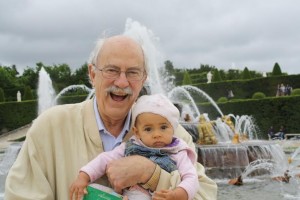
_____________________________________________________________________
One of the many important projects on which he was working before his death and that will now remain unfinished, is the commission to recreate the Italian recitatives for Cherubini’s epic Medea. Additionally he was preparing the Australian debut of a Händel ‘pasticcio’ Voyage to the Moon. His ability to find the missing pieces of an opera, and to then be able to reconstruct so many great operas through his editions, has in some ways its roots deep in his upbringing in rural Michigan USA. His father, Loris Curtis of Mason, Michigan, was an avid puzzler, and Alan used a similar passion in finding and, when necessary, composing sections of the missing pieces in order to bring the entire work back to life. This rural background also imbued in him a passionate love of nature and gardens in particular, so that when not making music, his favorite place was tending the many flowers that were a great joy to him in their various seasons.
This idea of growth, of nurturing was an essential part of his relationships with many singers, musicians, and artists as he had an extraordinary ability to see their potential. He simply knew how to help people around him to ‘grow’, to see the future brilliance of a singer who was not yet fully ‘formed’. As part of this, he coached them not only in music, but also in stage presence and movement, skills he learned, in part, from his second wife, the dance historian and choreographer Shirley Wynne (now deceased).
“Alan Curtis, burned with the brightest of flames, one which was finally spent in the blazing heat of a Florentine summer’s day. But the artistic light that he so effortlessly shed on all of us who were blessed to come within his smiling gaze, will illuminate the entire world forever”. John Pascoe. Florence, Italy July 2015.
